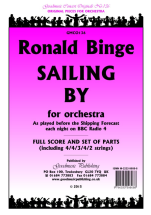Sailing By
Product ID: GM1 CO136
By Ronald Binge
Publisher:
Goodmusic
Arranger:
2 Flutes, Cor Anglais, 2 Clarinets in Bb, Bassoon, 2 Horns in F, 2 Trumpets in Bb, 3 Trombones, Percussion (Triangle, Vibraphone), HarpStrings (Violin 1, Violin 2, Viola, Cello, Bass)
Series:
Goodmusic Concert Originals
Genre:
Light Classic
Line Up:
Symphony Orchestra
Duration:
2:40
Level: 3 - 4
Set & Score
This item is out of stock
About this item
Sailing By
is a short piece for orchestra composed by Ronald Binge in 1963, which
is used before the late Shipping Forecast on BBC Radio. A slow waltz,
the piece uses a repetitive ABABC structure and features a distinctive
rising and falling woodwind arpeggio.
Loved by many late night
listeners, it is played every night on BBC Radio 4 at around 00:45hrs
before the late Shipping Forecast. Its tune is repetitive, assisting in
its role of serving as a signal for sailors tuning in to be able to
easily identify the radio station. It also functions as a buffer -
depending on when the final programme before closedown finishes, Sailing By
(or part of it) is played as a "filler" as the shipping forecast starts
at 00:48hrs precisely. The initial reason for its introduction was
because of the indeterminate finish time for the preceding Midnight
News, leading to filling music being played until the Shipping Forecast
was due to start.
Instrumentation
2 Flutes, Cor Anglais, 2 Clarinets in Bb, Bassoon,
2 Horns in F, 2 Trumpets in Bb, 3 Trombones,
Percussion (Triangle, Vibraphone), Harp
Strings (Violin 1, Violin 2, Viola, Cello, Bass)
Reviews and rating
No review available, be the first to write one!

Composer
Ronald Binge (1910-1979)

Ronald Binge (15 July 1910 – 6 September 1979) was a British composer and arranger of light music.
Binge was interested in the technicalities of composition and was most famous as the inventor of the "cascading strings" effect which is the signature sound of the Mantovani orchestra, much used in their arrangements of popular music. It was originally created to capture the essence of the echo properties of a building such as a cathedral, although it later became particularly associated with easy listening music genre.
His best known composition is probably Elizabethan Serenade (1951), which was used by the British Broadcasting Corporation as the theme for the popular 1950s series, "Music Tapestry," and as the play-out for the British Forces Network radio station, for which he won an Ivor Novello Award. It was later turned into a vocal version called Where the Gentle Avon Flows, with lyrics by the poet Christopher Hassall. Binge is also known for Sailing By (1963), the BBC Radio 4 Shipping Forecast theme. Other well-known pieces include Miss Melanie, Like Old Times, The Watermill (1958) for oboe and strings, and his Concerto for Alto Saxophone in E-flat major (1956). His largest, longest and most ambitious work is the four-movement Symphony in C ("Saturday Symphony") which was written during his retirement c. 1970 and performed in England and Germany.
Less well-known is a piano piece known as Vice Versa, a musical palindrome which was not only a front-to-back palindrome, but also exploited the two staves used for writing for piano. The music reads the same, whatever way it is turned. He later extended this theme, composing a piece known as Upside/Downside for his son, who was learning to play the recorder at Downside School. This musical palindrome was for piano, recorder and cello and again was universally reversible - two players could therefore play from the same sheet of music reading from opposite ends.
More info about the composer...



 Click above to view samples
Click above to view samples
